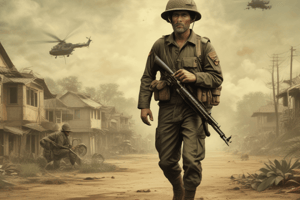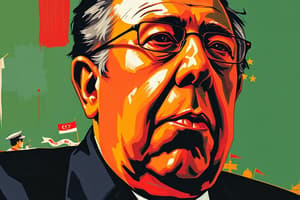Podcast
Questions and Answers
Who was Richard Nixon?
Who was Richard Nixon?
VP to Eisenhower, tag team with Kissinger on foreign policy in Vietnam.
What does the communist domino theory imply?
What does the communist domino theory imply?
- If one country becomes communist, neighboring countries will too. (correct)
- All countries will adopt democracy if one does.
- The United States will intervene in every communist country.
- Communism will fail after a single country's collapse.
What is Vietnamization?
What is Vietnamization?
The simultaneous withdrawal of American troops and escalation of military involvement, replacing American soldiers with Vietnamese troops.
What was Nixon's strategy for the Vietnam War?
What was Nixon's strategy for the Vietnam War?
What was Operation Menu?
What was Operation Menu?
What happened during Nixon's plummeting public approval?
What happened during Nixon's plummeting public approval?
What did Kissinger's plan in 1971 involve?
What did Kissinger's plan in 1971 involve?
What was launched in late 1970/early 1971?
What was launched in late 1970/early 1971?
What was the situation in 1971/1972 regarding the Vietnam War?
What was the situation in 1971/1972 regarding the Vietnam War?
What was a notable outcome of the negotiations in 1972?
What was a notable outcome of the negotiations in 1972?
Flashcards are hidden until you start studying
Study Notes
Richard Nixon
- Served as Vice President under Eisenhower.
- Collaborated with Henry Kissinger on foreign policies, particularly concerning Vietnam.
Communist Domino Theory
- A theory suggesting that if one country fell to communism, neighboring countries would follow.
Vietnamese Fractions
- Not detailed in the provided content. Further context needed.
Vietnamization
- Strategy involving the gradual withdrawal of American troops while increasing Vietnamese military involvement.
- Included air support and artillery for Vietnamese forces.
- Criticized for being paradoxical and contradictory.
Nixon's Strategy
- Employed the “Mad Man Theory” to obscure intentions.
- Appointed Kissinger as National Security Advisor in 1968.
- Developed a secret plan aiming to conclude the war within a year, deemed unrealistic.
- Operation Menu initiated on March 17, 1969, comprising:
- Phase 1: Operation Breakfast - extensive B-52 bombings near the Cambodian border.
- Phase 2: Operation Lunch - further actions along similar lines.
- Operation Duck Hook proposed heavy bombardments but was ultimately abandoned in favor of heightened nuclear alerts.
Nixon's Plummeting Public Approval
- Sought support from the "silent majority" during his time in office.
Kissinger's Plan (1971)
- Advocated gradual withdrawal of troops at a pace comfortable for Vietnamese forces or potential compromises with North Vietnam.
Late 1970/Early 1971
- Initiated an offensive into Laos, reflecting an escalation in military actions.
Stalemate (1971/1972)
- Marked by the Easter Offensive starting on March 30, 1972, which ultimately failed for the attacking forces.
Negotiations of 1972
- Both sides experienced fatigue and exhaustion from prolonged conflict.
- Nixon won reelection with a significant margin, capitalizing on his foreign policy strategies.
Negotiations (January 1973)
- Further details not provided; context around this period needs clarification.
Studying That Suits You
Use AI to generate personalized quizzes and flashcards to suit your learning preferences.




